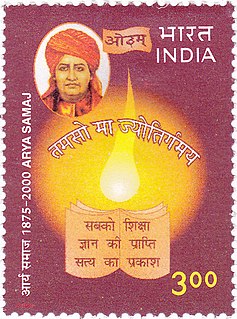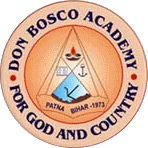
Maharshi Dayanand Saraswati was an Indian philosopher, social leader and founder of the Arya Samaj, a reform movement of the Vedic dharma. He was the first to give the call for Swaraj as "India for Indians" in 1876, a call later taken up by Lokmanya Tilak. Denouncing the idolatry and ritualistic worship, he worked towards reviving Vedic ideologies. Subsequently, the philosopher and President of India, S. Radhakrishnan called him one of the "makers of Modern India", as did Sri Aurobindo.

Arya Samaj is a monotheistic Indian Hindu reform movement that promotes values and practices based on the belief in the infallible authority of the Vedas. The samaj was founded by the sannyasi (ascetic) Dayanand Saraswati on 10 April 1875.

Pedagogy, most commonly understood as the approach to teaching, is the theory and practice of learning, and how this process influences, and is influenced by, the social, political and psychological development of learners. Pedagogy, taken as an academic discipline, is the study of how knowledge and skills are imparted in an educational context, and it considers the interactions that take place during learning. Both the theory and practice of pedagogy vary greatly, as they reflect different social, political, and cultural contexts.
Pt. Vishnu Deo OBE was the first Fiji born and bred leader of the Indo-Fijians. From his initial election to the Legislative Council in 1929 to his retirement in 1959, he remained the most powerful Indo-Fijians political leader in Fiji. He was a staunch supporter of Arya Samaj in Fiji and also the editor of the first successful Hindi-language newspaper to be published in Fiji.

The Arya Samaj was the first religious, cultural and educational Fiji Indian organisation established in Fiji. From its inception, in 1904, it attracted the young, educated and progressive Hindus into its fold. During the first three decades of the twentieth century, it was the sole voice of the Indian community in Fiji and as Fiji Indians won political rights, it was not surprising that first Indian members of the Legislative Council were all Arya Samajis. The influence of Arya Samaj over the Indians in Fiji gradually waned as other organisations representing Indians were established but it remained the dominant force in politics until 1959. The modern day Arya Samaj in Fiji still speaks out on issues affecting its members and its activities are visible through the numerous educational institutions that it manages.

Midnapore Collegiate School, formerly Governmental Zilla School, established on 14 November 1834, is one of the oldest schools in Bengal as well as India. The students and teachers of this school made contributions to Indian Freedom Movement during the British Rule. Khudiram Bose, a martyr in the freedom struggle was one of the students of the school. Some other alumni of the institution are Bankim Chandra Chattopadhyay, Manik Bandopadhyay. Brahmo Samaj leader Wrishi Rajnarayan Basu as headmasters had also contributed in building up the institution. It was formerly the Zilla School of Midnapore in West Bengal. The school campus has a basketball court and science labs. Students qualify for the Madhyamik and the Higher Secondary examinations and competitive exams like JEE(Main), JEE(Advanced), WBJEE, AIIMS, NEET, KVPY and Olympiad. The school has 47 teachers and 1400 students. From HERE you can get Support for class 12 students.

Pandit Ami Chandra Vidyalankar was an Indo-Fijian educator, preacher, labour leader, politician and football administrator. He served as a member of the Legislative Council between 1947 and 1953.

Don Bosco Academy, Patna is a co-educational institution located in the Digha area of Patna, India, established in 1973. It is affiliated to the Council for the Indian School Certificate Examinations, New Delhi – ISC/ICSE school. It was founded by Alfred de Rozario and his wife Dorothy de Rozario. It is now managed by the Don Bosco Anglo-Indian Educational Society. The current principal of the school is Mrs. Mary Alphonsa.

Suriname has possibly the highest proportion of Hindus who are Arya Samajis, compared to any other country. In Suriname, the Hindu population had split, with roughly 20% following the teachings of Swami Dayanand Saraswati, founder of the Ārya Samāj, and 80% following the Sanatan Dharm. According to the census of 2012 the number of Ārya Samājĩs is 16,661. The arrival of Arya Samaj preachers in Suriname, in 1929, caused a rift in the Hindu community, between the followers of Sanātanī and the Ārya Samāj.

Arya Samaj is a Hindu reform movement in South Africa. Like other parts of the world where people of Indian origin are settled, the teachings of Swami Dayananda Saraswati, founder of the Arya Samaj, made their way to South Africa during the beginning of the twentieth century. The Arya Samaj encouraged Indian South Africans to take pride in their heritage and culture and promoted education and social reform.

College of Magic is a nonprofit organization based in Cape Town, South Africa that teaches magic to people from various levels of society with the goal of creating social empowerment. College of Magic addresses key community concerns at grassroots level.
Hindu Maha Sabha was an organisation representing various Hindu organisations and was formed in Fiji in 1926, following the formation of All-India Hindu Maha Sabha in India. The formation of the organisation both in India and Fiji occurred after the assassination of Swami Shraddhanand, a Hindu activist in India. The formation of the Sabha in Fiji coincided with the formation of a national Muslim organisation, the Fiji Muslim League.
Arya Samaj has existed in Singapore since 1927 and runs Hindi classes at its premises through the Dayanand Anglo-Vedic Schools System.

Arya Samaj is a Hindu reform movement in Mauritius. Established in 1911, the Arya Paropkarini Sabha was officially registered in 1913. Since its creation Arya Samaj has had a great influence on the religious, social, educational and political lives of the people of Indian origin on the island. It has endeavoured to uphold the principles and ideals set forth by Maharishi Dayanand and his reformist movement. Some of the more notable ideals are women parity and free access to education. It has provided Hindus with a choice of progressive Hinduism, has promoted education with particular emphasis on Hindi and established orphanages, primary schools, colleges and tertiary institution.
Sanātana Dharma, many Hindus refer to their religion as Sanātana Dharma and it is used in Hindi alongside the more common Hindu Dharm.
Indian School Al Wadi Al Kabir (ISWK), established in 1978, is located in the city of Muscat, Oman. The school was founded by Founded in 1941 as a Gujarati Medium School for the children of the members of the business community. Mr. Lobo was principal of the school since 1990 to spring 2008. Later there was another principal Mr.P.N.Ashok who resigned in 2012. The present principal is Mr. D. Nageswar Rao.
The Arya Vedic School is a private school in Ngara, a suburb of Nairobi, Kenya. It was founded by the Arya Samaj in 1980. The school has remained at the forefront of academic excellence throughout the year teaching students discipline and respect. As part of its participation in the International General Certificate for Secondary Education, the school participates in the annual Edexcel final examinations which are held between June and August every year in which the senior-most class takes part. As of 2012, the senior-most class at the primary level also take part in a similar examination.
Nakasi 9½ Miles is a suburb located along the Suva - Nausori corridor, in the Central Division of the Republic of Fiji. The 9½ Miles factor is also used to identify the locality as it denotes the distance from Suva as it forms the common identification of the suburbs along the Kings Highway from Suva to Nausori. Nakasi is located 15 km north-east of Suva city and 5 km south of Nausori. It falls under the jurisdiction of the local government area of the township of Nausori. Nakasi is one of the largest of the many suburbs along the Suva-Nausori corridor. The current population stands at 18,919.
Sanātanī (सनातनी) is a term used to describe Hindu duties that incorporate various teachings from The Vedas, The Upanishads, and other Hindu texts such as The Ramayana and The Bhagavad Gita, which itself is often described as a concise guide to Hindu philosophy and a practical, self-contained guide to life. Followers of Sanatana Dharma are also called Sanatanis.

Bhawani Dayal later Bhawani Dayal Sanyasi was a wealthy South African of Indian descent, an activist for Indians in South Africa and an editor of various India-related newsletters such as the Pravasi. He collaborated with Mohandas Gandhi, and represented the South African Indians at the Indian National Congress while also being active in the Arya Samaj, the propagation of the Hindi language and in other Indian diaspora movements of the time. He was accepted as a person who renounced worldly pleasures as a sanyasi giving him the later name and the prefix Swami.












